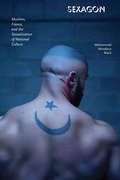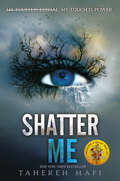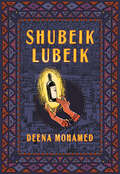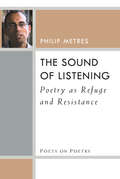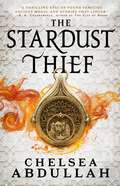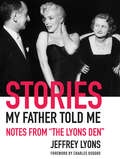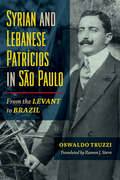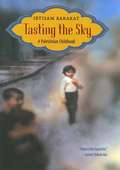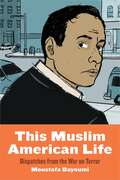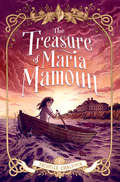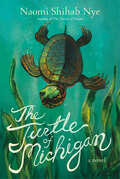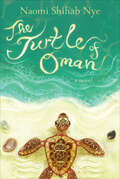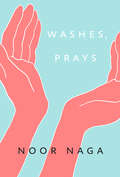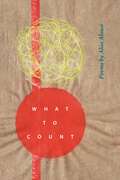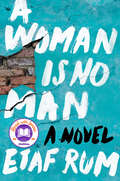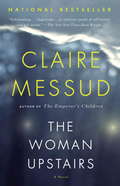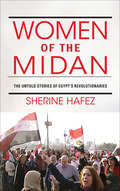Special Collections
Arab American Book Award
- Table View
- List View
Saving Sky
by Diane StanleyThe country is at war, terrorists strike at random, widespread rationing is in effect, and the power grid is down. But thirteen-year-old Sky Brightman is remarkably untouched by it all. She lives off the grid on sixty acres of rural New Mexico ranch land with chores to do and horses to ride and no television or internet to bring disturbing news into her family's adobe house. Sky's schoolmates think she's a little weird.
Then a string of mysterious arrests begins, and her new friend, Kareem, becomes a target. Sky is finally forced to confront the world in all its complexity. Summoning her considerable courage and ingenuity, she takes a stand against injustice. With humor, hope, and fierce determination, she proves that even a child can change the world.
Sexagon
by Mehammed Amadeus MackHonorable Mention, Association for Middle East Women’s StudiesHonorable Mention, 2018 Arab American Book Awards (Non-Fiction)In contemporary France, particularly in the banlieues of Paris, the figure of the young, virile, hypermasculine Muslim looms large. So large, in fact, it often supersedes liberal secular society’s understanding of gender and sexuality altogether. Engaging the nexus of race, gender, nation, and sexuality, Sexagon studies the broad politicization of Franco-Arab identity in the context of French culture and its assumptions about appropriate modes of sexual and gender expression, both gay and straight.Surveying representations of young Muslim men and women in literature, film, popular journalism, television, and erotica as well as in psychoanalysis, ethnography, and gay and lesbian activist rhetoric, Mehammed Amadeus Mack reveals the myriad ways in which communities of immigrant origin are continually and consistently scapegoated as already and always outside the boundary of French citizenship regardless of where the individuals within these communities were born. At the same time, through deft readings of—among other things—fashion photography and online hook-up sites, Mack shows how Franco-Arab youth culture is commodified and fetishized to the point of sexual fantasy.Official French culture, as Mack suggests, has judged the integration of Muslim immigrants from North and West Africa—as well as their French descendants—according to their presumed attitudes about gender and sexuality. More precisely, Mack argues, the frustrations consistently expressed by the French establishment in the face of the alleged Muslim refusal to assimilate is not only symptomatic of anxieties regarding changes to a “familiar” France but also indicative of an unacknowledged preoccupation with what Mack identifies as the “virility cultures” of Franco-Arabs, rendering Muslim youth as both sexualized objects and unruly subjects.The perceived volatility of this banlieue virility serves to animate French characterizations of the “difficult” black, Arab, and Muslim boy—and girl—across a variety of sensational newscasts and entertainment media, which are crucially inflamed by the clandestine nature of the banlieues themselves and non-European expressions of virility. Mirroring the secret and underground qualities of “illegal” immigration, Mack shows, Franco-Arab youth increasingly choose to withdraw from official scrutiny of the French Republic and to thwart its desires for universalism and transparency. For their impenetrability, these sealed-off domains of banlieue virility are deemed all the more threatening to the surveillance of mainstream French society and the state apparatus.
Shatter Me
by Tahereh Mafi"You can't touch me," I whisper. I'm lying, is what I don't tell him. He can touch me, is what I'll never tell him. But things happen when people touch me. Strange things. Bad things. No one knows why Juliette's touch is fatal, but The Reestablishment has plans for her. Plans to use her as a weapon. But Juliette has plans of her own. After a lifetime without freedom, she's finally discovering a strength to fight back for the very first time-and to find a future with the one boy she thought she'd lost forever.
Shubeik Lubeik
by Deena MohamedA brilliantly original debut graphic novel that imagines a fantastical alternate Cairo where wishes really do come true. Shubeik Lubeik—a fairy tale rhyme that means &“your wish is my command&” in Arabic—is the story of three people who are navigating a world where wishes are literally for sale.&“Mohamed builds a rich and harrowing world—and finds every place a fascinating story might be hiding.&” —Mattie Lubchansky, editor of The NibThree wishes that are sold at an unassuming kiosk in Cairo link Aziza, Nour, and Shokry, changing their perspectives as well as their lives. Aziza learned early that life can be hard, but when she loses her husband and manages to procure a wish, she finds herself fighting bureaucracy and inequality for the right to have—and make—that wish. Nour is a privileged college student who secretly struggles with depression and must decide whether or not to use their wish to try to &“fix&” this depression, and then figure out how to do it. And, finally, Shokry must grapple with his religious convictions as he decides how to help a friend who doesn&’t want to use their wish. Deena Mohamed brings to life a cast of characters whose struggles and triumphs are heartbreaking, inspiring, and deeply resonant.Although their stories are fantastical—featuring talking donkeys, dragons, and cars that can magically avoid traffic—each of these people grapples with the very real challenge of trying to make their most deeply held desires come true.
The Sound of Listening
by Philip MetresPhilip Metres stakes a claim for the cultural work that poems can perform—from providing refuge to embodying resistance, from recovering silenced voices to building a more just world, in communities of solitude and solidarity. Gathering a decade of his writing on poetry, he widens our sense of poetry as a way of being in the world, proposing that poems can offer a permeability to marginalized voices and a shelter from the imperial noise and despair that can silence us. The Sound of Listening ranges between expansive surveys of the poetry of 9/11, Arab American poetry, documentary poetry, landscape poetry, installation poetry, and peace poetry; personal explorations of poets such as Adrienne Rich, Khalil Gibran, Lev Rubinstein, and Arseny Tarkovsky; and intimate dialogues with Randa Jarrar, Fady Joudah, and Micah Cavaleri, that illuminate Metres’s practice of listening in his 2015 work, Sand Opera.
The Stardust Thief
by Chelsea AbdullahInspired by stories from One Thousand and One Nights, this book weaves together the gripping tale of a legendary smuggler, a cowardly prince, and a dangerous quest across the desert to find a legendary, magical lamp.Neither here nor there, but long ago . . . Loulie al-Nazari is the Midnight Merchant: a criminal who, with the help of her jinn bodyguard, hunts and sells illegal magic. When she saves the life of a cowardly prince, she draws the attention of his powerful father, the sultan, who blackmails her into finding an ancient lamp that has the power to revive the barren land—at the cost of sacrificing all jinn.With no choice but to obey or be executed, Loulie journeys with the sultan's oldest son to find the artifact. Aided by her bodyguard, who has secrets of his own, they must survive ghoul attacks, outwit a vengeful jinn queen, and confront a malicious killer from Loulie's past. And, in a world where story is reality and illusion is truth, Loulie will discover that everything—her enemy, her magic, even her own past—is not what it seems, and she must decide who she will become in this new reality.
Stories My Father Told Me
by Charles Osgood and Jeffrey LyonsThis amazing collection of choice anecdotes takes us right back to the Golden Age of New York City nightlife, when top restaurants like Toots Shor's, "21," and Sardi's, as well as glittering nightclubs like the Stork Club, Latin Quarter, and El Morocco, were the nightly gathering spots for great figures of that era: movie and Broadway stars, baseball players, champion boxers, comedians, diplomats, British royalty, prize-winning authors, and famous painters. From Charlie Chaplin to Winston Churchill, from Ethel Barrymore to Sophia Loren, from George Burns to Ernest Hemingway, from Joe DiMaggio to the Duke of Windsor: Leonard Lyons knew them all. For forty glorious years, from 1934 to 1974, he made the daily rounds of Gotham nightspots, collecting the exclusive scoops and revelations that were at the core of his famous newspaper column, "The Lyons Den."In this entertaining volume Jeffrey Lyons has assembled a considerable compilation of anecdotes from his father's best columns, and has also contributed a selection of his own interviews with stars of today, including Penélope Cruz and George Clooney, among others. Organized chronologically by decade and subdivided by celebrity, Stories My Father Told Me offers fascinating, amusing stories that are illustrated by approximately seventy photographs. He so captured the tenor of those exciting times that the great Lincoln biographer Carl Sandburg said: "Imagine how much richer American history would have been had there been a Leonard Lyons in Lincoln's time."
Syrian and Lebanese Patricios in Sao Paulo
by Oswaldo TruzziSyrian and Lebanese immigrants to Brazil chose to settle in urban areas, a marked contrast to many other migrant groups. In São Paulo, these newcomers embraced new lives as merchants, shopkeepers, and industrialists that made them a dominant force in the city's business sector. Oswaldo Truzzi's original work on these so-called patrícios changed the face of Brazilian studies. Now available in an English translation, Truzzi's pioneering book identifies the complex social paths blazed by Syrian and Lebanese immigrants and their descendants from the 1890s to the 1960s. He considers their relationships to other groups within São Paulo's kaleidoscopic mix of cultures. He also reveals the differences--real and perceived--between Syrians and Lebanese in terms of religious and ethnic affinities and in the economic sphere. Finally, he compares the two groups with their counterparts in the United States and looks at the wave of Lebanese Muslims to São Paulo that began in the 1960s.
Tasting the Sky
by Ibtisam BarakatIn this powerful, groundbreaking memoir, Ibtisam Barakat captures what it is like to be a child whose world is shattered by war.
This Muslim American Life
by Moustafa BayoumiWinner of the 2016 Evelyn Shakir Non-Fiction Arab American Book AwardA collection of insightful and heartbreaking essays on Muslim-American life after 9/11Over the last few years, Moustafa Bayoumi has been an extra in Sex and the City 2 playing a generic Arab, a terrorist suspect (or at least his namesake “Mustafa Bayoumi” was) in a detective novel, the subject of a trumped-up controversy because a book he had written was seen by right-wing media as pushing an “anti-American, pro-Islam” agenda, and was asked by a U.S. citizenship officer to drop his middle name of Mohamed.Others have endured far worse fates. Sweeping arrests following the terrorist attacks of September 11, 2001 led to the incarceration and deportation of thousands of Arabs and Muslims, based almost solely on their national origin and immigration status. The NYPD, with help from the CIA, has aggressively spied on Muslims in the New York area as they go about their ordinary lives, from noting where they get their hair cut to eavesdropping on conversations in cafés. In This Muslim American Life, Moustafa Bayoumi reveals what the War on Terror looks like from the vantage point of Muslim Americans, highlighting the profound effect this surveillance has had on how they live their lives. To be a Muslim American today often means to exist in an absurd space between exotic and dangerous, victim and villain, simply because of the assumptions people carry about you. In gripping essays, Bayoumi exposes how contemporary politics, movies, novels, media experts and more have together produced a culture of fear and suspicion that not only willfully forgets the Muslim-American past, but also threatens all of our civil liberties in the present.
The Treasure of Maria Mamoun
by Michelle ChalfounTwelve-year-old Maria lives a lonely, latchkey-kid's life in the Bronx. Her Lebanese mother is working two nursing jobs to keep them afloat, and Maria keeps her worries to herself, not wanting to be a burden. Then something happens one day between home and school that changes everything. Mom whisks them to an altogether different world on Martha's Vineyard, where she's found a job on a seaside estate. While the mysterious bedridden owner--a former film director--keeps her mother busy, Maria has the freedom to explore a place she thought could only exist in the movies. Making friends with a troublesome local character, Maria finds an old sailboat that could make a marvelous clubhouse. She also stumbles upon an old map that she is sure will lead to pirate's plunder--but golden treasure may not be the most valuable thing she discovers for herself this special summer.
The Turtle of Michigan
by Naomi Shihab NyeThe stand-alone companion to National Book Award Finalist and beloved poet Naomi Shihab Nye’s The Turtle of Oman. The Turtle of Michigan is a deft and accessible novel that follows a young boy named Aref as he travels from Muscat, Oman, to Ann Arbor, Michigan, and adjusts to a new life and a new school in the United States. A wonderful pick for young middle grade readers and fans of Other Words for Home and Billy Miller Makes a Wish. Aref is excited for his journey to reunite with his father in Ann Arbor, Michigan. Aref makes a friend on an airplane, wonders what Michigan will be like, and starts school in the United States. While he does miss his grandfather, his Sidi, Aref knows that his home in Oman will always be waiting for him.Award-winning author Naomi Shihab Nye’s highly anticipated sequel to The Turtle of Oman explores immigration, family, and what it means to feel at home. Carrying a suitcase and memories of Oman, Aref experiences the excitement and nervousness that accompanies moving to a new home. The Turtle of Michigan is a great choice for reading aloud and a must-have for younger middle grade readers. Illustrated in black-and-white throughout.
The Turtle of Oman
by Naomi Shihab NyePraised by the Horn Book as “both quiet and exhilarating,” this novel by the acclaimed poet and National Book Award Finalist Naomi Shihab Nye follows Aref Al-Amri as he says goodbye to everything and everyone he loves in his hometown of Muscat, Oman, as his family prepares to move to Ann Arbor, Michigan. This book was awarded a 2015 Middle East Book Award, was named a Notable Book by the American Library Association, and includes extra material by the author. Aref Al-Amri does not want to leave Oman. He does not want to leave his elementary school, his friends, or his beloved grandfather, Siddi. He does not want to live in Ann Arbor, Michigan, where his parents will go to graduate school. His mother is desperate for him to pack his suitcase, but he refuses. Finally, she calls Siddi for help. But rather than pack, Aref and Siddi go on a series of adventures. They visit the camp of a thousand stars deep in the desert, they sleep on Siddi's roof, they fish in the Gulf of Oman and dream about going to India, and they travel to the nature reserve to watch the sea turtles. At each stop, Siddi finds a small stone that he later slips into Aref's suitcase—mementos of home.Naomi Shihab Nye's warmth, attention to detail, and belief in the power of empathy and connection shines from every page. Features black-and-white spot art and decorations by Betsy Peterschmidt.
Washes, Prays
by Noor NagaRBC Bronwen Wallace Award winner Noor Naga's bracing debut, a novel-in-verse about a young woman's romantic relationship with a married man and her ensuing crisis of faith.2021 Arab American Book Award - George Ellenbogen Poetry Award, WinnerPat Lowther Memorial Award, WinnerGerald Lampert Memorial Award, LonglistFred Cogswell Award For Excellence In Poetry, Second Place WinnerCBC Best Canadian Poetry of 2020Coocoo is a young immigrant woman in Toronto. Her faith is worn threadbare after years of bargaining with God to end her loneliness and receiving no answer. Then she meets her mirror-image; Muhammad is a professor and father of two. He's also married. Heartbreaking and hilarious, this verse-novel chronicles Coocoo's spiraling descent: the transformation of her love into something at first desperate and obsessive, then finally cringing and animal, utterly without grace. Her best friend, Nouf, remains by her side throughout, and together they face the growing contradictions of Coocoo's life. What does it mean to pray while giving your body to a man who cannot keep it? How long can a homeless love survive on the streets? These are some of the questions this verse-novel swishes around in its mouth.
What to Count
by Alise AlousiWith heart and insight, the poems in Alise Alousi’s What to Count speak to what it means to come of age as an Iraqi American during the first Gulf War and its continuing aftermath, but also to the joy and complexity of motherhood, daughterhood, and what it means to live a creative life. More than a description of the world, Alousi’s poetry actively lives in and of the world. These poems explore the nuances of memory through the changes wrought by time, conflict, and distance. In "The Ocularist" and "Art," and others, Alousi’s extraordinary verbal deftness precisely locates the still-tender pains and triumphs of collective being while trying to be an individual in the world. What to Count is a remarkable collection of contemporary poetry—both a lyrical splendor and a contemplative account of lineage, silenced history, and identity.
A Woman Is No Man
by Etaf RumA Goodreads Choice Awards Finalist for Best Fiction and Best Debut • BookBrowse's Best Book of the Year • A Marie Claire Best Women's Fiction of the Year • A Real Simple Best Book of the Year • A PopSugar Best Book of the Year • A New York Times Book Review Editors’ Choice • A Washington Post 10 Books to Read in March • A Newsweek Best Book of the Summer • A USA Today Best Book of the Week • A Washington Book Review Difficult-To-Put-Down Novel • A Refinery 29 Best Books of the Month • A Buzzfeed News 4 Books We Couldn't Put Down Last Month • A New Arab Best Books by Arab Authors • An Electric Lit 20 Best Debuts of the First Half of 2019 • A The Millions Most Anticipated Books of the Year“Garnering justified comparisons to Khaled Hosseini’s A Thousand Splendid Suns... Etaf Rum’s debut novel is a must-read about women mustering up the bravery to follow their inner voice.” —Refinery 29The New York Times bestseller and Read with Jenna TODAY SHOW Book Club pick telling the story of three generations of Palestinian-American women struggling to express their individual desires within the confines of their Arab culture in the wake of shocking intimate violence in their community."Where I come from, we’ve learned to silence ourselves. We’ve been taught that silence will save us. Where I come from, we keep these stories to ourselves. To tell them to the outside world is unheard of—dangerous, the ultimate shame.”Palestine, 1990. Seventeen-year-old Isra prefers reading books to entertaining the suitors her father has chosen for her. Over the course of a week, the naïve and dreamy girl finds herself quickly betrothed and married, and is soon living in Brooklyn. There Isra struggles to adapt to the expectations of her oppressive mother-in-law Fareeda and strange new husband Adam, a pressure that intensifies as she begins to have children—four daughters instead of the sons Fareeda tells Isra she must bear.Brooklyn, 2008. Eighteen-year-old Deya, Isra’s oldest daughter, must meet with potential husbands at her grandmother Fareeda’s insistence, though her only desire is to go to college. Deya can’t help but wonder if her options would have been different had her parents survived the car crash that killed them when Deya was only eight. But her grandmother is firm on the matter: the only way to secure a worthy future for Deya is through marriage to the right man.But fate has a will of its own, and soon Deya will find herself on an unexpected path that leads her to shocking truths about her family—knowledge that will force her to question everything she thought she knew about her parents, the past, and her own future.
The Woman Upstairs
by Claire MessudNora Eldridge, a 37-year-old elementary school teacher in Cambridge, Massachusetts, is on the verge of disappearing. Having abandoned her desire to be an artist, she has become the "woman upstairs," a reliable friend and tidy neighbour always on the fringe of others' achievements. Then into her classroom walks a new pupil, Reza Shahid, a child who enchants as if from a fairy tale. He and his parents--dashing Skandar, a half-Muslim Professor of Ethical History born in Beirut, and Sirena, an effortlessly glamorous Italian artist--have come to America for Skandar to teach at Harvard.But one afternoon, Reza is attacked by schoolyard bullies who punch, push and call him a "terrorist," and Nora is quickly drawn deep into the complex world of the Shahid family. Soon she finds herself falling in love with them, separately and together. Nora's happiness explodes her boundaries--until Sirena's own ambition leads to a shattering betrayal.Written with intimacy and piercing emotion, this urgently dispatched story of obsession and artistic fulfillment explores the thrill--and the devastating cost--of giving in to one's passions. The Woman Upstairs is a masterly story of America today, of being a woman and of the exhilarations of love.
Women of the Midan
by Sherine HafezAn exploration of gender, the Arab Spring, and women&’s experiences of revolution, including firsthand accounts. In Women of the Midan, Sherine Hafez demonstrates how women were a central part of revolutionary process of the Arab Spring. Women not only protested in the streets of Cairo, they demanded democracy, social justice, and renegotiation of a variety of sociocultural structures. Women&’s resistance to state control, Islamism, neoliberal market changes, the military establishment, and patriarchal systems forged new paths of dissent and transformation. Through firsthand accounts of women who participated in the revolution, Hafez illustrates how the gendered body signifies collective action and the revolutionary narrative. Using the concept of rememory, Hafez shows how the body is inseparably linked to the trauma of the revolutionary struggle. While delving into the complex weave of public space, government control, masculinity, and religious and cultural norms, Hafez sheds light on women&’s relationship to the state in the Arab world today and how the state, in turn, shapes individuals and marks gendered bodies.

